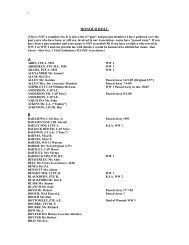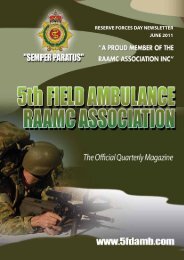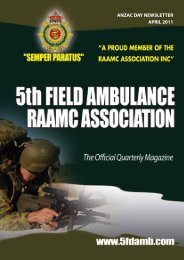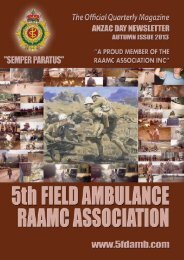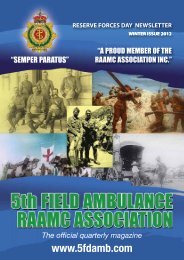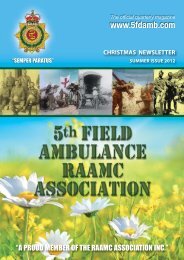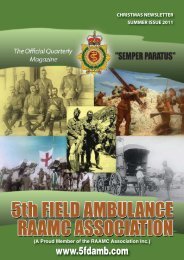2010 Paulatim Magazine - RAAMC Association
2010 Paulatim Magazine - RAAMC Association
2010 Paulatim Magazine - RAAMC Association
Create successful ePaper yourself
Turn your PDF publications into a flip-book with our unique Google optimized e-Paper software.
Watch your language<br />
One of the challenges within any ADF operation is communication.<br />
Also consider that in Australia there are approximately 22 million<br />
people speaking almost 400 languages. 1 Irrelevant of the area of<br />
where the operation is being conducted, soldiers need to communicate<br />
with others around them. Languages Other Than English (LOTE) can<br />
lead to participation with the people in the surrounding environment<br />
and an increase in information access whilst on deployment.<br />
The ADF is communicating with the “Net Generation”. Numerous articles<br />
have been written on this topic and this generation’s interaction with the<br />
ADF including mentoring of junior leaders. 2 Junior leaders (ranks of<br />
LCPL/CPL and LT/CAPT) normally interact with many subordinates on a<br />
daily basis. These leaders are in the position to potentially recognize<br />
and actively encourage their subordinates to attempt LOTE training or<br />
testing. These junior leaders will also be able to use LOTE trained<br />
members to enhance their communication on deployments and in the<br />
battlefield.<br />
Junior commanders can use a skilled LOTE member to provide basic<br />
introductory phrases to the rest of the sub unit. The basic salutations<br />
(hello/goodbye/Mr/Mrs/Miss) and expressions/phrases (thank<br />
you/please/ouch/stop) can start communication with a stranger who<br />
may be a patient, enemy, POW or potential informant. Consider if one<br />
unit LOTE trained member was to teach a phrase per week to your<br />
unit/subunit. I suggest that by the end of the year your personnel could<br />
potentially be able to appropriately use all the common basic salutation<br />
phrases of the target language. Empowering and then demanding the<br />
junior leader to develop LOTE at the lowest team level within the sub<br />
unit will ensure future capability for the future potential roles. 3<br />
Language capability is an all corps responsibility and therefore<br />
commanders at all levels should be actively forward planning and<br />
participating in long term strategies to grow these capabilities. 4<br />
It appears individual units staff must struggle against competing<br />
training and unit needs in order to participate in LOTE training.<br />
There is little awareness of the need to develop LOTE capability within<br />
the ADF, a necessity born from our geographic position.<br />
ADF health professionals have a reputation confirmed by the number of<br />
awards over the past few decades in many theatres, operations and<br />
within different roles. The requirements of ADF health professionals<br />
over the past few decades have been complex and future requirements<br />
require further planning, discussion and doctrine. 5 As our strategic<br />
reach, reputation and countries we work in vary all staff should plan<br />
and encourage LOTE growth and training for future potential<br />
operations. LOTE training within the ADF is well organised and available<br />
in many forms. The training has many benefits for the unit and has<br />
financial benefits for the individual. This training is publicised and<br />
available to all ranks.<br />
Soldiers will have a continuing requirement in future operations for<br />
LOTE skills. The unit or sub-unit that has these internal skills will more<br />
effectively communicate with the deployed social environment. This will<br />
lead to more effective participation within that environment and<br />
gathering of information from it which can lead to better efficiency and<br />
patient health during operations.<br />
WO2 Josh McDade is currently a career manager at SCMA. His<br />
operational and overseas experiences include Rifle Coy Butterworth,<br />
1st Guards (Singapore), OP BEL ISI II, OP WARDEN/STABALISE, OP<br />
GOLD, OP TANAGER, High Density and Altitude Training (PNG) and OP<br />
CITADEL. His Force preparation experience includes for all of the above<br />
as well as UNAMIR, OP SCRUMMAGE, OP MAZURKA, OP FALCONER, OP<br />
BASTILLE, OP SLIPPER and many more. He has communicated (in their<br />
mother tongue) with natives of Malaysia, Indonesia, PNG and<br />
Bougainville whilst deployed overseas. WO2 McDade’s awards include<br />
AASM, ASM, ADM, DLSM, UN medal, MUC and Commander Training<br />
Command – Army Commendation.<br />
References<br />
1<br />
Year Book 2009-<strong>2010</strong>, Australian Bureau of Statistics<br />
By: WO2 Josh McDade<br />
2<br />
Lt Col Dan Fortune, Commanding the Net Generation, Australian Army Journal, Volume 1,<br />
Number 2<br />
4<br />
D Ashley, Adaptive campaigning and the need to empower our junior leaders to deliver the ‘I’m<br />
an Australian soldier’ initiative, Australian Army Journal, Volume 6, Number 3<br />
5<br />
Harry Baxter, Challenging times, Defence <strong>Magazine</strong>, May 2006<br />
6<br />
SJ Neuhaus, NI Klinge, RM Mallet and DHM Saul, Adaptive Campaigning – Implications for<br />
Operational Health Support, Australian Army Journal, Volume 5, Number 3<br />
8 6 P A U L AT I M – M A GAZINE O F T HE R OYA L A U S T R A L I A N A R M Y M E DICAL C O R P S – 2 0 1 0



